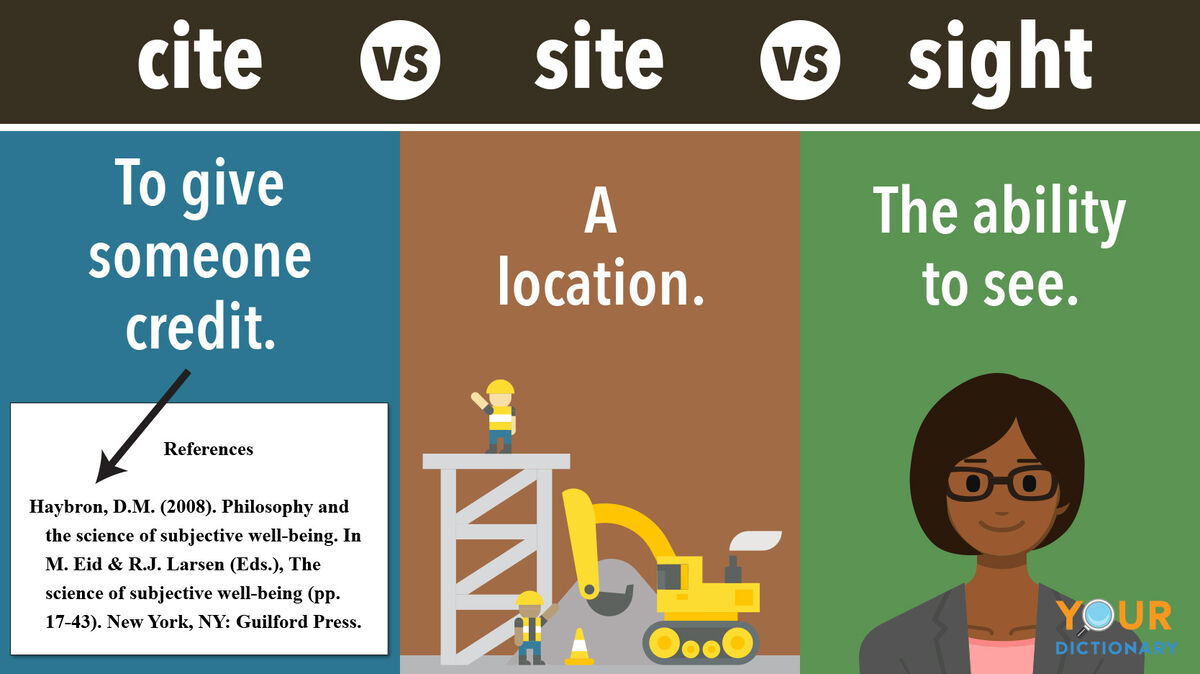
reference section of a paper for cite, construction site, and person wearing glasses for sight
Do you cite or site sources in an essay? What's the difference between site and sight? Even though these three words sound exactly the same, they have totally different meanings. Learn when to use site vs. cite vs. sight with these definitions and examples.
Difference Between Cite, Site and Sight
Cite, site and sight are easy to confuse because, despite their different spellings, they sound the same when spoken aloud. However, once you get a handle on their distinct meanings, the difference will become clear.
- cite - to quote a source; to praise someone or something
- site - an area where something is built or located; a website
- sight - the ability to see; a location or thing to be seen
Quick Tips to Remember the Difference
If you need to make a quick decision on which word to use, focus on these key tips:
- Making a citation? Use cite.
- Would this place work as a campsite? Use site.
- Are you talking about eyesight? Use sight.
Because these words are so different, it's best to know which one you intend to use. Your spellchecker might not notice if you use the wrong word, but your teacher — or your readers — definitely will!
Meaning and Use of Cite: To Give Someone Credit
Of these three words, cite is the only one that only functions as a verb. It comes from the Latin citare and the Old French citer meaning "to call." The most common modern definition refers to citing one's sources when using a quote or idea from another person's writing. It can also refer to providing a similar example or even an influential figure. For example:
- Please cite at least two reference sources in your bibliography.
- The newly elected president cited Abraham Lincoln as his inspiration for running for office.
- Terry's lawyer is citing several similar cases as precedent in his closing statement.
Using Cite to Give Praise
Another common use of cite is when you recognize someone for something or praise someone for doing a good job. Examples of this usage include:
Our CEO will cite Paula for her hard work and honorable ethics.
Officer Warwick was cited for his quick thinking in rescuing the hostages.
The mayor is citing the entire fire department after they saved City Hall from burning down.
Meaning and Use of Site: A Location
Site, which comes from the Latin situs ("position"), functions as both a noun and a verb. You're probably most familiar with the noun form, especially when it's used in a compound word to describe a location. For example:
- The noise from the bulldozers and cranes at the construction site disturbs all the neighbors.
- You can find all our contact information on our company's website.
- Marjory's favorite campsite is between the river and the fishing pond.
Using Site as a Verb
You can also use site as a verb. The verb form is most common in architecture and civil engineering and refers to placing a position or location. Some examples include:
- The residential neighborhood was sited in the foothills, far away from the power plant.
- City planners try to site playgrounds in convenient, safe areas.
- We're siting a good area to build the next section of the freeway.
Using On-Site
Site is also used when referring to something that is "on-site" at a place.
The builders will be on-site tomorrow.
They attended on-site training for the job.
There’s going to be an on-site inspection later.
Meaning and Use of Sight: The Ability to See
Unlike cite and site, sight does not come from Latin. It comes from the Old English gesiht and the German sicht, both of which mean "ability to see." Today, sight means both the sense of seeing and the thing you are seeing, such as in the word sightseeing.
You can use sight as a noun and a verb, but like site, it's more commonly used as a noun. For example:
- Helen Keller lost both her hearing and her sight when she was a baby.
- Stay out of sight until I tell you to come out.
- The lights of Las Vegas are quite a sight to see.
Using Sight as a Verb
Another function of sight is the verb forms "to sight" or sighted, which mean "to catch sight of" or "to aim." For example:
- It's important to sight your camera on the image you're trying to capture.
- We sighted four owls and a hawk on our hiking trip.
- The soldier sighted his rifle at the enemy vehicle.
Cite, Site and Sight are Homophones
Now that you know the different definitions and origins of cite vs. site vs. sight, you can tell that the only thing they have in common is their sound. That makes these three words homophones — words that are spelled differently and mean different things but are pronounced the same. Learn more about homophones with an explanation of break vs. brake. You can also check out more examples of homophones if you're curious about words that sound the same but function differently.